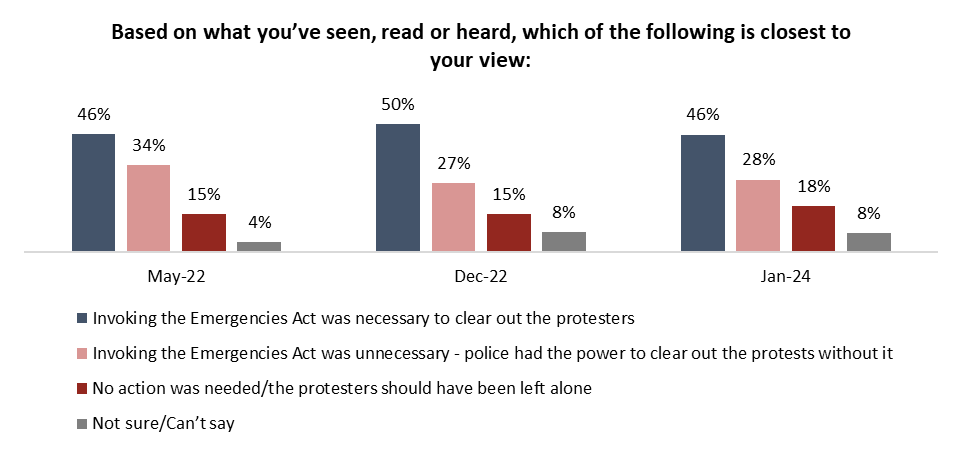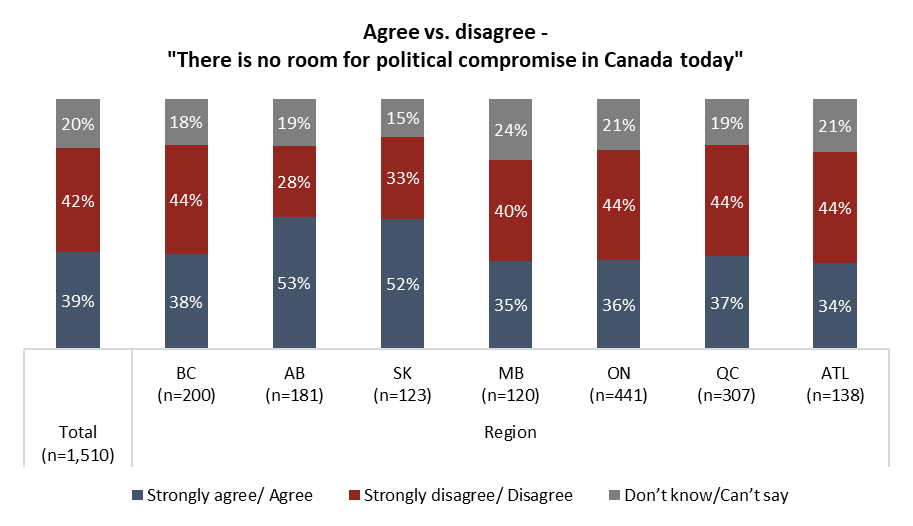
Emergencies Act court ruling a reminder of the political divisions that led to convoy protests
January 30, 2024 – A federal court ruling on Canada’s first-ever use of the Emergencies Act calling it “not justified” has revived debate over the controversial use of the extraordinary measure to shut down the convoy protest in 2022. Meanwhile, the issues of disenchantment with the federal government and political division which perhaps fueled the protest continue to linger.
New data from the non-profit Angus Reid Institute finds three-in-five (58%) feel their federal government does not care about the issues that are important to them. This widespread disenchantment comes as the Liberal party wallows in a recent nadir of political support.
Meanwhile, in this report which is the third in a multi-part series assessing democracy and politics in Canada and the U.S., Canadians offer a bleak assessment of whether or not political division can be bridged. Two-in-five (42%) believe political compromise is possible in today’s environment, but as many (39%) disagree.
These dim views of the political system in the country come in the wake of a fractious period for Canada. The Freedom Convoy protests in 2022 exposed fault lines that had further deepened during the COVID-19 pandemic. A recent federal court ruling called the federal government’s 2022 use of the Emergencies Act “not justified”. And while the Trudeau government may not have the court’s legal opinion on its side, it holds onto public opinion regarding the issue. Data collected last week found nearly half (46%) believe invoking the legislation it was necessary to clear the protests, while 28 per cent say police already had the necessary powers required to end the demonstrations. Notably, almost one-in-five are of the view that the protesters should have been left alone entirely. Canadians lean towards believing the federal government’s move to appeal is the right decision (45%) than the wrong one (36%).

Other reports in the Angus Reid Institute’s State of the Nations series
About ARI
The Angus Reid Institute (ARI) was founded in October 2014 by pollster and sociologist, Dr. Angus Reid. ARI is a national, not-for-profit, non-partisan public opinion research foundation established to advance education by commissioning, conducting and disseminating to the public accessible and impartial statistical data, research and policy analysis on economics, political science, philanthropy, public administration, domestic and international affairs and other socio-economic issues of importance to Canada and its world.
INDEX
Part One: Political discourse in a time of division
-
Emergencies Act: public opinion versus legal opinion
-
To appeal or not? Canadians lean to yes
-
Bridging the divide: Is compromise possible?
Part Two: Enfranchisement
-
Three-in-five say federal government doesn’t care about their issues
Part One: Political discourse in a time of division
Emergencies Act: public opinion versus legal opinion
One of the most significant tests of Canada’s democracy occurred in February 2022, when Freedom Convoy protesters descended on Ottawa with the goal of having the governor general dissolve the government. The protesters occupied Canada’s capitol for more than a month until the federal government controversially invoked the Emergencies Act to grant police additional powers to clear the protests.
Last week, a federal court ruled that there “was no national emergency justifying the invocation of the Emergencies Act”, siding with the Canadian Civil Liberties Association and the Canadian Constitution Foundation, which brought forward the case. The two groups argued the federal government had not met the legal threshold when it invoked the never-before-used act.
This ran counter to what the public inquiry headed by Justice Paul Rouleau concluded in 2023. After six weeks of public testimony, and analysis of cabinet documents, the Rouleau inquiry found “the very high threshold for invocation was met”. However, notably, Rouleau also said that “reasonable and informed people could reach a different conclusion than the one I arrived at” in a statement after the inquiry report was made public.
The contrary conclusions from the Rouleau inquiry and the federal court ruling have not swayed Canadians’ opinion on whether or not they believe the Emergencies Act was necessary.
In data taken after the federal court’s ruling last week, approaching half (46%) say the Act was necessary to remove the protesters from Ottawa, while three-in-ten (28%) believe the Emergencies Act was unnecessary because police already had the powers needed. The minority who believes no action was needed and the protest should have continued has grown slightly to one-in-five (18%).

Men are more likely than women to believe it was unnecessary for the federal government to invoke the Emergencies Act. However, for all demographics except for 35- to 54-year-old men, that is a minority opinion. Women older than 54 are the only demographic to believe invoking the Emergencies Act was necessary at a majority level (63%, see detailed tables).
Political leanings are a strong driver of opinion on this matter. Conservative leader Pierre Poilievre said he supported the protesters who were “law-abiding” and “peaceful”, while “condemning” those who broke laws. Past CPC voters are much more likely to believe either invoking the Emergencies Act was unnecessary (43%) or the protesters should have been left alone (32%) than those who voted Liberal or NDP in 2021:

To appeal or not? Canadians lean to yes
The federal government has said it plans to appeal the ruling on the case brought forward by the Canadian Constitution Foundation and the Canadian Civil Liberties Association. Canadians are split as to whether or not it should, with more (45%) saying it should follow through on the appeal than not (36%). Political affiliations, again, provides a sharp delineation on this matter:

Bridging the divide: Is compromise possible?
As Canadians – and their government – revisit one of the most divisive chapters in recent Canadian memory, it serves as a reminder of the resilience, or fragility, of being able to navigate difficult or opposing political issues. Do Canadians believe there is room for political compromise in 2024? Even on this, the country is evenly divided, with almost as many saying yes (39%) as no (42%). These figures are similar to those seen when the Angus Reid Institute first asked this question in the wake of the trucker protests in 2022.
Related: Politics and disengagement: Two-in-five say there’s “no room” for compromise in Canada; most say their interests are ignored
The current minority government is perhaps a testament to the possibility of bridging a political divide, though most would view it as a gulch than a canyon. Canada’s two major left-leaning political parties, the NDP and Liberals, developed a supply-and-confidence agreement, which allows the Liberals to govern in a more comfortable position than minority governments are typically afforded, provided they advance NDP policy goals.
With this in the background, at least half of past NDP and Liberal voters believe there’s room for political compromise in Canada today. Past CPC voters, who are the outside looking in on this arrangement, are much more likely to disagree:

Canadians also perhaps find evidence for a lack of political cooperation not only between political parties, but also between levels of government. Provincial governments in Alberta and Saskatchewan have advanced sovereigntist agendas in recent years – Alberta through the passing of the Alberta Sovereignty within a United Canada Act and the Saskatchewan through the Saskatchewan First Act. Both pieces of legislation look to affirm provincial jurisdiction and defend against what the provinces believe is federal government overreach. After neither provincial government found a federal government willing to compromise on net-zero electricity regulations, both acts were used for the first time in short succession in 2023.
As their provincial governments fight back against federal policy, slim majorities in Alberta and Saskatchewan believe there is no room for political compromise in Canada. Elsewhere, Canadians lean towards believing political cooperation is possible:

Part Two: Enfranchisement
Three-in-five say federal government doesn’t care about their issues
As many wonder if political compromise is possible, there are more who believe the federal government is focused on issues they don’t find important. The rising cost of living has been the top issue on Canadians’ minds for two years, and there are many who feel they are falling behind despite inflation’s deceleration in recent months. Meanwhile, the issues of health care and housing affordability have become more pressing in the same interval but have seen little progress.
Related: Cost and Effect: Heightened economic anxiety pushes many 2021 Liberal voters to look elsewhere for relief
Overall, the one-third (36%) who agree that the “federal government cares about issues that are important to me” are outnumbered by the three-in-five (58%) who disagree. And at least half in all regions in the country say the federal government is unconcerned with what they find important. This rises to seven-in-10 in Alberta and Saskatchewan:

A majority of those who voted Liberal in 2021 believe the government run by the party they voted for cares about the issues they find important. However, Liberal voters are the only past voters who believe this at a majority level. And, notably, one-in-four in this group (25%) disagree, providing further evidence that there is a disillusionment even from past party voters as the Liberals’ support shrinks from the 2021 election.

Those who believe Canada’s political environment is one of absolutism and not one of cooperation are also more likely to be disenchanted with the federal government. Seven-in-ten (69%) in that group say they don’t believe the federal government cares about issues important to them.
Canadians who believe there is room for political compromise are more divided when it comes to whether or not the federal government pays attention to the problems they are concerned with:

Survey Methodology:
The Angus Reid Institute conducted an online survey from Jan. 9-12, 2024 among a representative randomized sample of 1,510 Canadian adults who are members of Angus Reid Forum. For comparison purposes only, a probability sample of this size would carry a margin of error of +/- 2 percentage points, 19 times out of 20.
ARI conducted a second online survey from Jan. 24-26, 2024 among a representative randomized sample of 1,608 Canadian adults who are members of Angus Reid Forum. For comparison purposes only, a probability sample of this size would carry a margin of error of +/- 2 percentage points, 19 times out of 20.
Discrepancies in or between totals are due to rounding. Both surveys were self-commissioned and paid for by ARI.
For detailed results by age, gender, region, education, and other demographics, click here.
For detailed results from the Emergencies Act questions by age, gender, region, education and other demographics, click here.
To read the full report, including detailed tables and methodology, click here.
To read the questionnaires, click here.
Image – Photo 242052877 © Beth Baisch | Dreamstime.com
MEDIA CONTACT:
Shachi Kurl, President: 604.908.1693 [email protected] @shachikurl
Jon Roe, Research Associate: 825.437.1147 [email protected] @thejonroe


